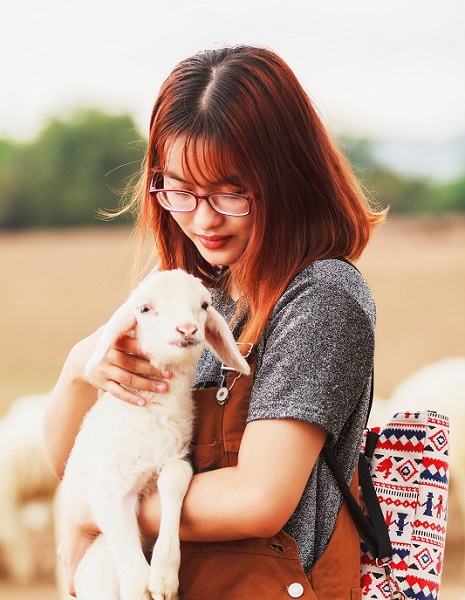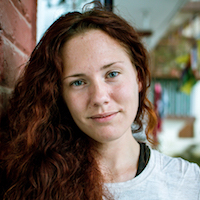
Hi, how are you? Are you ready to order? Would you like the small or large shrimp po’boy? Fries, sure. With gravy and cheese? No, the roast beef is not fatty; we have lean meat. Extra side of tartar sauce, no problem.
For 11 years, most of my days were filled with asking questions like these. During that time, I managed, bartended, and served at my family’s New Orleans restaurant. It was a popular po’boy sandwich shop in the city and considered a tourist destination.
So last year, when I decided to leave both the restaurant and New Orleans, it was a complete shock to my family, coworkers, and customers.
How could I, a born and raised Southern woman, leave a landmark family restaurant where I loved everyone and was on track to one day be part-owner? It was a place that honored family, respected employees, and took active part in the local community. Departing didn’t make much sense. I told people I had other interests I wanted to pursue, which was true.
However, this was not the main reason.
Nola, as the locals call it, is a place known for being heavy-handed with liquor and having some of the richest and most decadent food in the world. Its recipes are blended from spices and batter sourced from a mix consisting of the French, Spanish, and Southern cultures. Like most restaurants in the “Big Easy,” my family’s message was for people to gather together and eat good food. However, when I started to look closer at these dishes, I noticed a major ingredient was missing: compassion.
Compassion is love in action. It is recognizing our non-separateness. It is a passerby giving a homeless person his warm jacket, a mother protecting her child from harm, men marching for women’s rights, and teenagers advocating for gun control.
It is also what we put on our plates. Through culture, family, media, and even parts of the medical field, we are taught that eating animals is not only necessary for our survival, but also that this is how it has always been.
I am vegan, and I can’t tell you how many times I’ve heard, “Humans have been eating meat for thousands of years, and there’s nothing you nor anyone else can say or do to change that.” In part, they have a point. Each person has to make the choice for him or herself. But for a better understanding, let us take a look at what veganism is really about.
Veganism is currently the fastest growing social movement. Vegans do not eat or use any items that contain animals or animal byproducts; they also do not support events or institutions, like circuses or zoos, that use animals for entertainment.
No matter how big or small and no matter if we have the best or worst of intentions, our every action has an effect. Each year, more than 60 billion land animals and one thousand billion sea animals are killed for food. Over 40 percent of the world’s grain and one-third of all the fresh water on earth are used to feed, hydrate, and maintain land and sea animals raised for food. Animal agriculture is one of the main causes of rapid climate change, a large percentage of bodily diseases, and the spread of global poverty. We, in America, have the educational resources available and know the statistics, yet many of us turn our heads in complete denial.
While more and more people are switching to a plant-based diet, the vast majority are still eating animals. The U.S. falls closely behind Australia, being the second-most land animal eating country in the world. There is an overflow of scientific information available on the effects of consuming animal products. Plus, more and more plant-based food products are surfacing each year.
However, these trends are only influencing a minority to switch, which has me wondering what it will take for the majority of Americans to wake up to the urgency of this situation.
The meat, dairy, and egg industry have become so ingrained within American society that many people are put off when one even mentions the word vegan. So, why did I leave the restaurant? The way I lived my personal life was not in line with how I made my living. While leaving lessened a load off my conscience, it also illuminated the fact that to not eat animals is to be an outsider. Actress Portia de Rossi once said in an interview, “It is harder to be vegan than gay; people have a harder time accepting it.”
We live in a society that accepts people who eat land and sea animals, dairy products, and eggs. So when a person is around someone who is vegan, it can be inconvenient and, at the same time, confronting. I’ve been invited to family holiday gatherings where the relative hosting told me I had to cook my own meal. I’ve seen people I’m dining with at a restaurant roll their eyes as I place my order. I’ve also heard comments like, “Carrots have feelings too.” To be honest, for a while these things did hurt and get me upset. However, when faced with these situations, I have learned it is important to remain grounded in compassion. By retaliating, we only lose sight of both the lives we are fighting for and the loved-ones we are interacting with.
The Dalai Lama says, “Compassion is a necessity not a luxury. Without it, humanity cannot survive.” Veganism is more than eating tofu and avoiding leather; it is a lifestyle based on compassion for all living beings. We live in a country where focusing on our own self-growth and success has become the norm.
In India, I once heard an American woman tell a Tibetan monk that we must have compassion for ourselves before we can begin with other people. His response was that once you show compassion to others then you will start to feel compassion for yourself. Great social movements have never started with the idea, “I must get it for myself first before I am willing to give to another.” It’s about thinking in terms of the collective.
Just because something has been a part of human history or culture, doesn’t mean it is correct or provides betterment for the world. For example, racism, misogyny, and religious persecution have been happening for thousands of years. There are laws that work to prevent these practices, but we, as a society, are still fighting these oppressive behaviors. There is a common thread that runs through every prejudice and objectification. It is the attitude of supremacy. We see this superiority in our relationship to species in that they are used for agriculture, consumer products, experimentation, and entertainment—this form of oppression is called speciesism.
Like the Civil Rights and Women’s Movement, veganism is a movement to end injustice. Every day, thousands of beings are abused and physically tortured, separated from their families, and killed because they happen to be born of a certain species. As children, one minute our parents are telling us to treat others like we would like to be treated. The next, they are serving us a plate consisting of a dead cow, pig, chicken, or fish.
A cow that did not give permission to have her calf or milk taken.
A pig that did not say, “Please go ahead and kill me for my flesh.”
A chicken that did not say, “Sure take my eggs.”
A fish that did not voluntarily jump out of its natural habitat to suffocate on land.
Then, when we finish our meal, any leftover scraps go to the animal that we do not abuse or kill: the family dog. These incongruent actions imply we are not only separate, but also that some are worthier than others.
Social injustice takes root in that “I am different and better than you” mentality. To truly stand for justice for all, our thoughts, words, and actions need to be aligned. Often times, we compromise our integrity for the sake of social acceptance, money, and convenience. At one time, I did forfeit my values in the name of money and comfort. Now, I can tell you that integrity is my driving force, which turns out to be much more rewarding and comfortable.
Martin Luther King Jr. said, “Our lives begin to end the day we become silent about things that really matter.” To advocate for animals is to help stop child hunger, it is to reverse the near-extinction of species, it is to provide clean drinking water, and it is to work to prevent natural disasters. Most importantly, veganism is a march for life. It is for every living being to be happy and free.
My goal here is not to preach. It is a plea for us to open our hearts. Compassion always begins now. It is an opportunity to feel connected. It is a chance for peace. We will not have peace among humans if we cannot have peace with the millions of coinhabitants that also reside on this earth.
When I think about making this change, I’m reminded of a quote by the late Coretta Scott King: “Veganism is interconnected with all other struggles against oppression. To kill an animal for no other reason than your taste or fashion preference is to exercise a dangerous lack of compassion.” The wife of Martin Luther King Jr. became vegan at age 68, proving that no matter one’s age, it is possible to make the connection. She believed that fighting for animal rights was the next step in her husband’s non-violent activism.
When I left the restaurant, I thought I was only taking a step toward helping animals. I now realize that I wasn’t just taking a stand for the lives of animals; I was taking a stand to end oppression regardless of gender, race, religion, and sexual orientation. This is not about joining one group called “Vegan” and condemning the “Non-vegan Other.” We are all deeply connected.
Gandhi profoundly said, “We must be the change we wish to see in the world.” It begins with each and every one of us taking that first step and becoming the peace and harmony we all so desperately long for. Let us take that leap and start with what we put on our plates.
It is up to me. It is up to you.
~
Relephant:
A Letter to Myself Before I Went Vegan.
A Few Practical Tips for those Considering Going Vegan.
~
Author: Cat Kennedy
Image: Bin Thieu/Unsplash
Editor: Nicole Cameron
Copy Editor: Yoli Ramazzina






Read 0 comments and reply